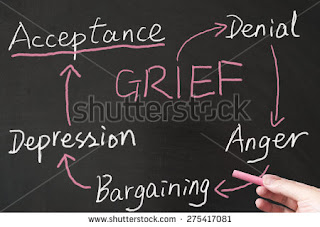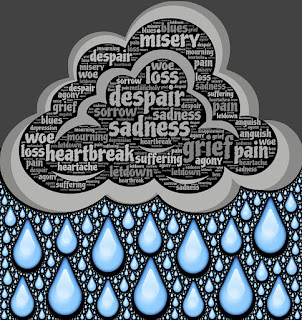Substance Abuse, Disability, and Grief
The other day I spoke to a fiend about her brother's new disability due to a car accident. She told me he had a really hard time dealing with the situation. For a long time, he was in denial, then he was angry at the world and God for punishing him this way. Eventually, he got so depressed that he turned to abusing his pain killers and got addicted to them - so now he is also dealing with substance abuse. Some of you are probably wondering what is the relationship between these three topics. Those who suffered all three know that dealing with each of these issue actually have a lot of similarities, much more than we can think. If you think about it carefully, the way my friend's brother reacted to his acquired disability will remind you of the stages of grief and how you possibly reacted to losing someone you cared about.
When we experience grief there are 5 common stages that most people go through. We do not necessarily have to experience all stages, nor they appear in a certain order. We are all very different people so we experience loss (and all other things) in a unique way. Some people even go back and forth between the stages. The common stages are: Shock & Denial, Anger, Bargaining, Depression, and Acceptance. When you read the research about emotional reaction to a chronic illness or disability you'll find a common thread between the two. Grief is a common reaction to losing something. When we lose a body part, the ability to function the way we used to, or suffer through other perceived losses such as social status, our job, or any other major aspect of our lives it might affect us very similar to losing someone. People will likely be in shock, denial, or disbelief initially. Other common reactions include bargaining, anger, depression and guilt (read more here).
Substance abuse relates to these two topic in few ways. One things that really frustrates me is that many medical providers unfortunately do not spend enough time explaining to people the risks related to taking pain killers and how addictive they can become. After working in treatment for the past 4.5 years I got to see way too many people who got injured and acquired a substance abuse addiction as a result of their chronic pain or inability to deal with the grief related to their disability. Of course that is not the only reason for their new habit, but I believe some cases could have been prevented if there was more awareness about it. What is important to remember, that with the right support and guidance, dealing with a chronic illness, chronic pain or disability can become manageable and severity of substance use can be prevented. Glazier and Kling (2013) claim that substance abuse is much more prevalent among people with disabilities. I believe that this population is somewhat left out at times and do not get all the support they need because they isolate and do not know how to reach out for help.
At the end of the day, almost all of us know he feeling of losing someone we care about. Imagine how it feels like to lose your ability to talk, walk, write, see, hear, or even being stripped away from your job, family, values and morals due to life's events??? Grief takes many forms and could affect anyone in any place. Counseling can help with the process. Treating the soul while dealing with substance abuse, disability or grief can prevent severity of symptoms or situation. Do not be afraid to ask for help. If you or someone you care about seems to need some support and guidance I am here to help.


